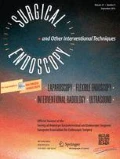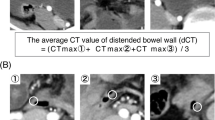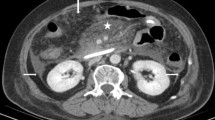Abstract
Background
Ischemic and necrotic damages are complications of digestive diseases and require emergency management. Nevertheless, the decision to surgically manage could be delayed because of no sufficiently preoperative accurate marker of ischemia diagnosis, extension, and prognosis.
Methods
The aim of this study was to assess the predictive value of serum procalcitonin (PCT) levels for diagnosing intestinal necrotic damages, their extension, and their prognosis in patients with ischemic disease including ischemic colitis and mesenteric infarction by a gray zone approach. Between January 2007 to June 2014, 128 patients with ischemic colitis and mesenteric infarction (codes K55.0 and K51.9) were operated, for whom data on PCT were available. We perform a retrospective, multicenter review of their medical records. Patients were divided into subgroups: ischemia (ID group) versus necrosis (ND group); the extension [focal (FD) vs. extended (ED)] and the vital status [deceased (D) vs. alive (A)].
Results
PCT levels were higher in the ND (n = 94; p = 0.009); ED (n = 100; p = 0.02); and D (n = 70; p = 0.0003) groups. With a gray zone approach, the predictive thresholds were (i) for necrosis 2.473 ng/mL, (ii) for extension 3.884 ng/mL, and (iii) for mortality 7.87 ng/mL.
Conclusion
In our population, PCT could be used as a marker of necrosis; especially in case of extended damages and reflects the patient’s prognosis.



Similar content being viewed by others
Abbreviations
- SB:
-
Small bowel
- PCT:
-
Procalcitonin
- CM:
-
Conservative management
- SM:
-
Surgical management
- Se:
-
Sensitivity
- Sp:
-
Specificity
- PPV:
-
Positive predictive value
- NPV:
-
Negative predictive value
- AUC:
-
Area under the curve
- ROC:
-
Receiver operating curve
- SD:
-
Standard deviation
References
Debus ES, Müller-Hülsbeck S, Kölbel T, Larena-Avellaneda A (2011) Intestinal ischemia. Int J Colorectal Dis 26:1087–1097
Park WM, Gloviczki P, Cherry KJ Jr, Bower TC, Panneton JM, Schleck C, Ilstrup D, Harmsen WS, Noel AA (2002) Contemporary management of acute mesenteric ischemia: factors associated with survival. J Vasc Surg 35:445–452
Kassahun WT, Schulz T, Richter O, Hauss J (2008) Unchanged high mortality rates from acute occlusive intestinal ischemia: six year review. Langenbecks Arch Surg 393:163–171
Menon NJ, Amin AM, Mohammed A, Hamilton G (2005) Acute mesenteric ischaemia. Acta Chir Belg 105:344–354
Denecke H, Stiegler H (1990) Indications and results of second-look operation in acute mesenteric vascular occlusion. Langenbecks Arch Chir Suppl II Verh Dtsch Ges Chir. 31:311–315
Renner P, Kienle K, Dahlke MH, Heiss P, Pfister K, Stroszczynski C, Piso P, Schlitt HJ (2011) Intestinal ischemia: current treatment concepts. Langenbecks Arch Surg 396:3–11
Wadman M, Syk I, Elmståhl S (2000) Survival after operations for ischaemic bowel disease. Eur J Surg 166:872–877
Maruna P, Nedelníková K, Gürlich R (2000) Physiology and genetics of procalcitonin. Physiol Res 49(Suppl 1):S57–S61
Assicot M, Gendrel D, Carsin H, Raymond J, Guilbaud J, Bohuon C (1993) High serum procalcitonin concentrations in patients with sepsis and infection. Lancet 341:515–518
Baruti Gafurri Z, Pacarizi H, Zhubi B, Begolli L, Topciu V (2010) The importance of determining procalcitonin and C reactive protein in different stages of sepsis. Bosn J Basic Med Sci 10:60–64
Nagata J, Kobayashi M, Nishikimi N, Komori K (2008) Serum procalcitonin (PCT) as a negative screening test for colonic ischemia after open abdominal aortic surgery. Eur J Vasc Endovasc Surg 35:694–697
Markogiannakis H, Memos N, Messaris E, Dardamanis D, Larentzakis A, Papanikolaou D, Zografos GC, Manouras A (2011) Predictive value of procalcitonin for bowel ischemia and necrosis in bowel obstruction. Surgery 149:394–403
Cosse C, Regimbeau JM, Fuks D, Mauvais F, Scotte M (2013) Serum procalcitonin for predicting the failure of conservative management and the need for bowel resection in patients with small bowel obstruction. J Am Coll Surg 216:997–1004
Cosse C, Sabbagh C, Rebibo L, Grelpois G, Galmiche A, Regimbeau JM (2014) Kinetics of procalcitonin in the management of small bowel obstruction: a preliminary report. Surg Curr Res 4:184
Parks DA, Bulkley GB, Granger DN, Hamilton SR, McCord JM (1982) Ischemic injury in the cat small intestine: role of superoxide radicals. Gastroenterology 82:9–15
Cannesson M, Le Manach Y, Hofer CK, Goarin JP, Lehot JJ, Vallet B, Tavernier B (2011) Assessing the diagnostic accuracy of pulse pressure variations for the prediction of fluid responsiveness: a “gray zone” approach. Anesthesiology 115:231–241
Hausfater P (2007) Procalcitonin measurement in adult clinical practice. Rev Med Int 28:296–305
Steinbach G, Rau B, Debard AL, Javourez JF, Bienvenu J, Ponzio A, Bonfà A, Hubl W, Demant T, Külpmann WR, Buchholz J, Schumann G (2004) Multicenter evaluation of a new immunoassay for procalcitonin measurement on the Kryptor system. Clin Chem Lab Med 42:440–449
Whang KT, Steinwald PM, White JC, Nylen ES, Snider RH, Simon GL, Goldberg RL, Becker KL (1998) Serum calcitonin precursors in sepsis and systemic inflammation. J Clin Endocrinol Metab 83:3296–3301
Von Heimburg D, Stieghorst W, Khorram-Sefat R, Pallua N (1998) Procalcitonin—a sepsis parameter in severe burn injuries. Burns 24:745–750
Van Langevelde P, Joop K, van Loon J, Frölich M, Groeneveld PH, Westendorp RG, van Dissel JT (2000) Endotoxin, cytokines, and procalcitonin in febrile patients admitted to the hospital: identification of subjects at high risk of mortality. Clin Infect Dis 31:1343–1348
Merle C, Lepouse C, De Garine A, Frayssinet N, Leymarie F, Leon A, Jolly D (2004) Surgery for mesenteric infarction: prognostic factors associated with early death within 72 hours. J Cardiothorac Vasc Anesth 18:734–741
ten Boekel E, Vroonhof K, Huisman A, van Kampen C, de Kieviet W (2006) Clinical laboratory findings associated with in-hospital mortality. Clin Chim Acta 372:1–13
Viallon A, Guyomarc’h S, Marjollet O, Berger C, Carricajo A, Robert F, Laporte S, Lambert C, Page Y, Zéni F, Bertrand JC (2008) Can emergency physicians identify a high mortality subgroup of patients with sepsis: role of procalcitonin. Eur J Emerg Med 15:26–33
Cotoi OS, Manjer J, Hedblad B, Engström G, Melander O, Schiopu A (2013) Plasma procalcitonin is associated with all-cause and cancer mortality in apparently healthy men: a prospective population-based study. BMC Med 11:180
Ryan T, Mc Carthy JF, Rady MY, Serkey J, Gordon S, Starr NJ, Cosgrove DM (1997) Early bloodstream infection after cardiopulmonary bypass: frequency rate, risk factors, and implications. Crit Care Med 25:2009–2014
Carboni GL, Fahrner R, Gazdhar A, Printzen G, Schmid RA, Hoksch B (2008) Comparison of procalcitonin and CrP in the postoperative course after lung decortication. Eur J Cardiothorac Surg 33:777–780
Andona P, Nix D, Wilson MF, Aljada A, Love J, Assicot M, Bohuon C (1994) Procalcitonin increase after endotoxin injection in normal subjects. J Clin Endocrinol Metab 79:1605–1608
Carlstedt F, Lind L, Joachimsson PO, Rastad J, Wide L, Ljunghall S (1999) Circulating ionized calcium and parathyroid hormone levels following coronary artery by-pass surgery. Scand J Clin Lab Invest 59:47–53
Oberhoffer M, Stonans I, Russwurm S, Stonane E, Vogelsang H, Junker U, Jäger L, Reinhart K (1999) Procalcitonin expression in human peripheral blood mononuclear cells and its modulation by lipopolysaccharides and sepsis-related cytokines in vitro. J Lab Clin Med 134:49–55
Zannoni A, Giunti M, Bernardini C, Gentilini F, Zaniboni A, Bacci ML, Forni M (2012) Procalcitonin gene expression after LPS stimulation in the porcine animal model. Res Vet Sci 93:921–927
Al-Nawas B, Shah PM (1996) Procalcitonin in patients with and without immunosuppression and sepsis. Infection 24:434–436
Becker KL, Nylén ES, White JC, Müller B, Snider RH Jr (2004) Clinical review 167: procalcitonin and the calcitonin gene family of peptides in inflammation, infection, and sepsis: a journey from calcitonin back to its precursors. J Clin Endocrinol Metab 89:1512–1525
Hoffmann G, Czechowski M, Schloesser M, Schobersberger W (2002) Procalcitonin amplifies inducible nitric oxide synthase gene expression and nitric oxide production in vascular smooth muscle cells. Crit Care Med 30:2091–2095
Rau B, Steinbach G, Gansauge F, Mayer JM, Grünert A, Beger HG (1997) The potential role of procalcitonin and interleukin 8 in the prediction of infected necrosis in acute pancreatitis. Gut 41:832–840
de Werra I, Jaccard C, Corradin SB, Chioléro R, Yersin B, Gallati H, Assicot M, Bohuon C, Baumgartner JD, Glauser MP, Heumann D (1997) Cytokines, nitrite/nitrate, soluble tumor necrosis factor receptors, and procalcitonin concentrations: comparisons in patients with septic shock, cardiogenic shock, and bacterial pneumonia. Crit Care Med 25:607–613
Kettelhack C, Hohenberger P, Schulze G, Kilpert B, Schlag PM (2000) Induction of systemic serum procalcitonin and cardiocirculatory reactions after isolated limb perfusion with recombinant human tumor necrosis factor-alpha and melphalan. Crit Care Med 28:1040–1046
Hoffmann G, Totzke G, Seibel M, Smolny M, Wiedermann FJ, Schobersberger W (2001) In vitro modulation of inducible nitric oxide synthase gene expression and nitric oxide synthesis by procalcitonin. Crit Care Med 29:112–116
Karabulut K, Gül M, Dündar ZD, Cander B, Kurban S, Toy H (2011) Diagnostic and prognostic value of procalcitonin and phosphorus in acute mesenteric ischemia. Ulus Travma Acil Cerrahi Derg 17:193–198
Disclosures
Cosse C, Sabbagh C, Browet F, Mauvais F, Rebibo L, Zogheib E, Chatelain D, Kamel S, and Regimbeau JM have no conflicts of interest or financial ties to disclose.
Author information
Authors and Affiliations
Corresponding author
Rights and permissions
About this article
Cite this article
Cosse, C., Sabbagh, C., Browet, F. et al. Serum value of procalcitonin as a marker of intestinal damages: type, extension, and prognosis. Surg Endosc 29, 3132–3139 (2015). https://doi.org/10.1007/s00464-014-4038-0
Received:
Accepted:
Published:
Issue Date:
DOI: https://doi.org/10.1007/s00464-014-4038-0




